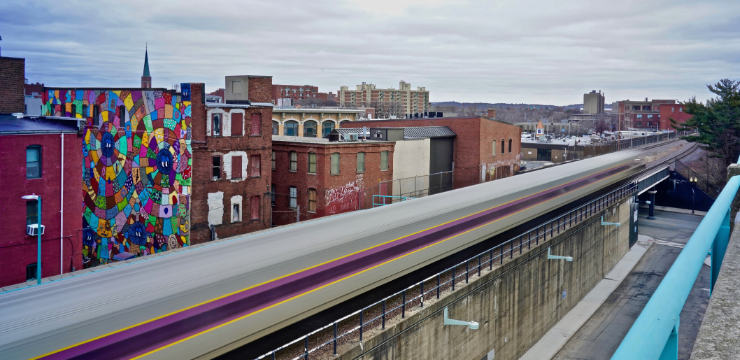In the most recent FMCB meeting, board chair Joe Aiello called out the one week fare decrease on the commuter rail from Lynn to North Station. The mitigation has had tremendous success during blue line construction. However, the MBTA has not committed to extending that fare decrease to encourage more ridership between Lynn and Boston.
The hesitancy to extend that fare decrease at a time when more service is needed to alleviate crowding on transit for essential workers demonstrates how current policies are constraining our ability to think about equitable access to transportation. This is just one of three key policy areas where equity is greatly needed, which we point out in our latest report, From Transactional to Transformational: The Case for Equity in Gateway City Transit-Oriented Development.
We know that the pandemic has the typical commuter rail rider working from home, which is the rationale that the T has used to put commuter rail service at the bottom of the priority list in its service recovery strategy. However, we, among others, have been pushing for transformation of commuter rail into regional rail-a service that provides fast, bidirectional, frequent, all day service for riders beyond white collar workers. Blue collar and service workers also need to get to work at hours that don’t always align with peaks. With these workers suffering the largest share of job losses, they need as many transportation options as possible to find new employment. And with just 15% of pre-pandemic travel attributed to commuting, the vast majority of the travelers are not being served by higher-speed transit like rail.
Many low- and moderate-wealth residents live in communities that connect to commuter rail stations but cannot afford to ride the train.We’ve discussed in detail why lower fares could improve ridership on existing rail and buses: the T’s own Weekend Fare campaign highlighted that success, and we’re grateful that the team has standardized fares across payment types, eliminating differentials between cash and Charlie card payments. But more needs to be done to close the gap of the extra 64-hours a year that black, brown, and poor riders spend riding slower transit.
The example of the blue line mitigation that improved commuter rail service from Lynn is representative of our limited thinking and lack of vision when it comes to using the pandemic’s lessons to improve equity across the Commonwealth. In the report, we talk about how patient capital is a key tool for investing in weak markets: returns will be slow in areas where equity gaps are deepest, and we have to be prepared to roll up our sleeves and be patient. The same is true of ridership on transit. It’s going to take more than a week to see ridership gains from new transit users thanks to fare modifications and service improvements. Even a year might not be enough, especially since experts point to a multi-year economic and public health recovery.
For equity to be a part of transportation policy – or any policy area – we must be patient and focus on the process, not instant results. Anything less, and we’ll wind up back where we started: a status quo economic expansion with widening equity gaps. In his annual address before the Greater Boston Chamber last week, Speaker DeLeo pledged to move forward with a bold transportation financing package this session. This was welcome news. Legislative leadership will be critical to positioning the state’s transportation networks to help shape an equitable recovery.
COVID-19 Response
|
Episode 58: Actionable ideas for equitable small business recovery
|
Housing and Economic Development
Transportation
Education
The Rennie Center publishes a Back-to-School Blueprint.

